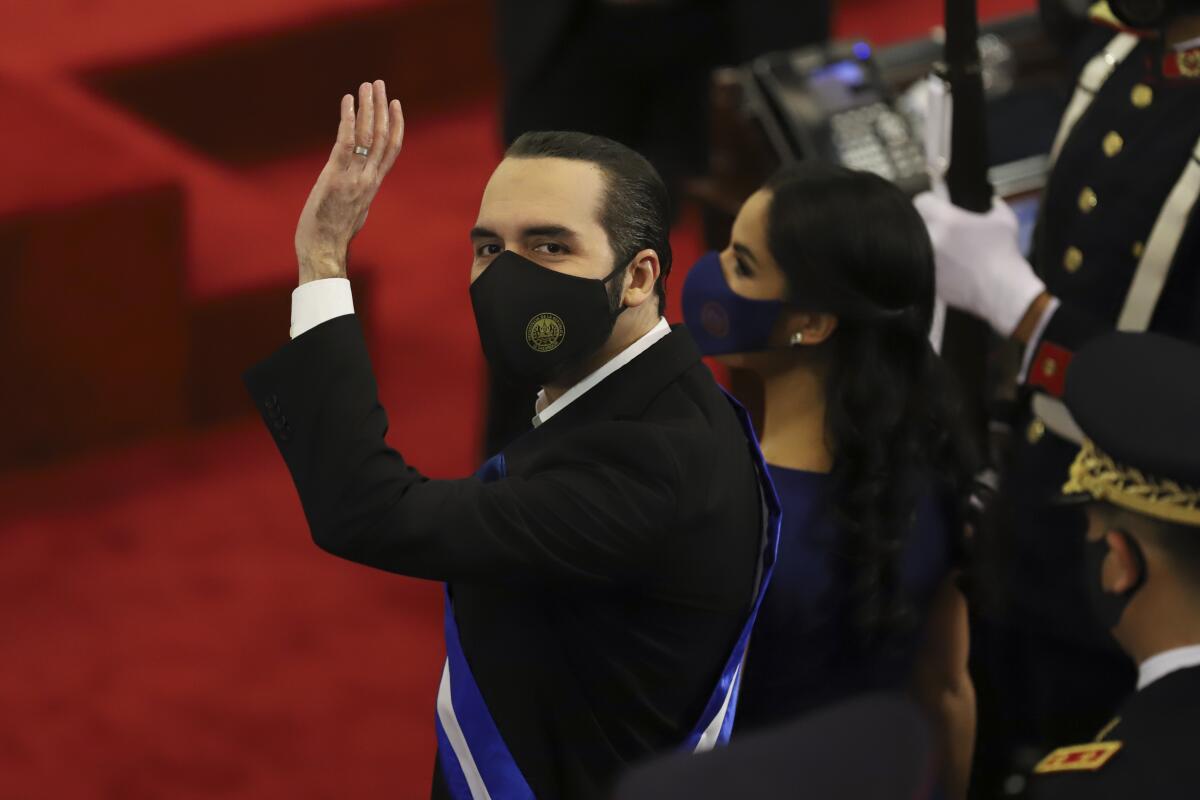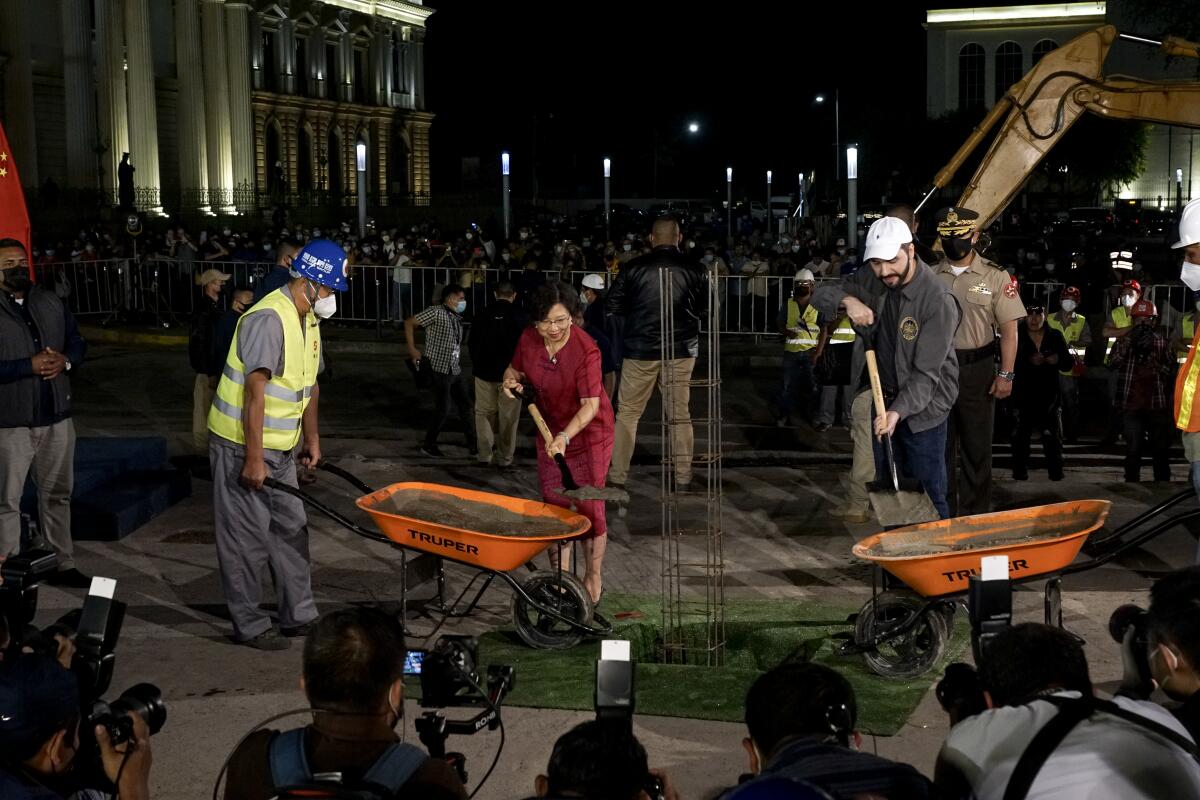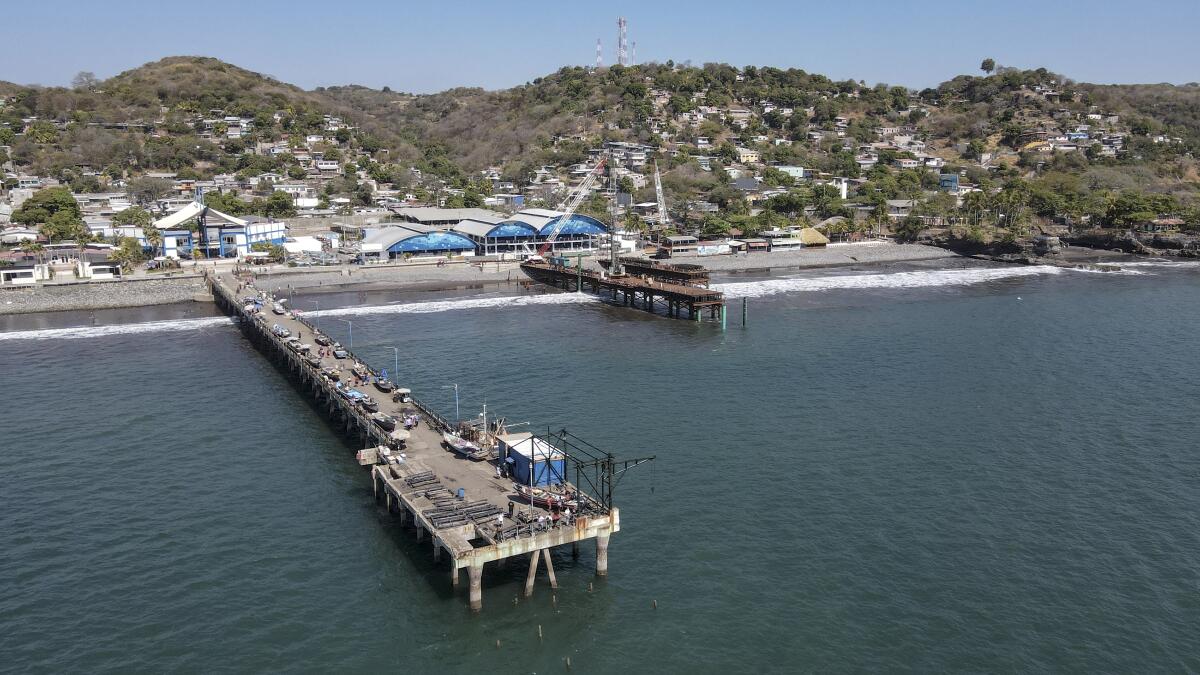In Latin America’s new Cold War, will China lift up autocrats?

- Share via
SAN SALVADOR — El Salvador’s president and the Chinese ambassador traded flatteries this month as they broke ground on a new national library, one of a slew of gifts China has promised this small mountainous nation as part of its vigorous quest to gain influence across Central America.
As they smiled for photos, Ambassador Ou Jianhong expressed her “greatest respect” for President Nayib Bukele, a polarizing leader who has assailed El Salvador’s democratic institutions and clashed repeatedly with U.S. officials. Bukele, in turn, praised Chinese President Xi Jinping, an authoritarian who has engineered China’s rise at the expense of civil liberties.
When the seven-story library is finished, it will loom above San Salvador’s central square, a symbol of China’s growing presence in the region and a reminder that as the relationship between the U.S. and El Salvador has chilled, El Salvador has found refuge in China’s deep pockets and warm embrace.

A new Cold War is brewing in Latin America between the U.S. and China amid a shifting global order driven more by economics and technology than by politics and ideology.
Over the last two decades, China has made significant inroads in the region, offering loans, forging free trade deals and expanding commerce at enormous rates. Trade between China and Latin America has grown 26-fold between 2000 and 2020, surpassing $315 billion, according to the World Economic Forum. Trade between the U.S. and Latin America totaled $767 billion in 2020.
Until recently, China’s activities had largely been focused on South America — buying up soybeans in Brazil, lithium in Bolivia and selling billions in Chinese goods and technology.
But it has increasingly trained its sights on Central America, a region less rich in natural resources and with relatively little buying power, but one that sends a clear message to the U.S.
China sees a foothold in Central America as a strategic counterbalance to U.S. encroachments in Asia, notably Washington’s condemnation of Beijing’s crackdown on Hong Kong and China’s territorial claims over the self-governing democratic island of Taiwan.
Of the 14 countries in the world that still have diplomatic relations with Taiwan, most are in Latin America and the Caribbean. China has already convinced Costa Rica, Nicaragua, the Dominican Republic and El Salvador to drop their recognition of Taiwan and forge ties with Beijing.
In exchange, it has offered lavish gifts, like construction of new roads, ports and stadiums, as well as another, sometimes more valuable offering: The promise of not meddling in a country’s domestic political affairs.

Unlike the United States, which often conditions its development aid based on a country’s adherence to Western-style democracy, China has a policy of what it calls “non-interference.”
“They don’t say anything about you and you don’t say anything about them,” said Carol Wise, a USC political science professor who wrote a book about China and Latin America. “That’s their rule.”
In Central America, a region beset by high crime and corruption and a long history of autocrats, there are growing fears that China’s billions of dollars and influence will help strengthen anti-democratic regimes. Some 8,000 miles away, China doesn’t have to worry about the potential consequences of a destabilized region, like the caravans of migrants that head toward the U.S. border.
“The Chinese money basically gives them space to consolidate their authoritarian rule,” said Evan Ellis, research professor of Latin American studies at the U.S. Army War College’s Strategic Studies Institute, who described the Chinese as “incubators of authoritarianism.”
“The result for the U.S. is you have a less democratic region to which we are closely tied by ties of geography and family and commerce,” he said.
That is what is happening in Nicaragua, where dictator Daniel Ortega has repeatedly been sanctioned by the U.S. for jailing political opponents and holding sham elections. After Nicaragua cut ties to Taiwan late last year, China announced an aid package that includes construction of housing for “tens of thousands of families” — an economic lifeline for a country regarded by most of the world as a pariah. Similar dynamics are at play in Venezuela, where China has provided President Nicolas Maduro technology to develop surveillance systems as well as billions in loans.
In El Salvador, Bukele has found himself increasingly isolated from much of the international community in recent months as his party has purged judges and prosecutors and ousted his critics on the Supreme Court, which recently cleared the way for him to seek reelection in 2024 despite a constitutional ban on consecutive presidential terms.
The U.S. has condemned those actions, comparing Bukele to the late Venezuelan leader Hugo Chávez and describing El Salvador as “a democracy in decline.”
The U.S. Agency for International Development redirected aid away from the government to civil society groups, and the Treasury Department blacklisted several close allies of the president, including his chief of staff and two officials that the U.S. says led secret negotiations with the MS-13 and 18th Street gangs to reduce violence and guarantee political support for Bukele’s political party in upcoming elections.
Bukele has been defiant, saying it is clear that the U.S. “does not accept collaboration, friendship or alliance,” and temporarily changing his Twitter bio to say: “the coolest dictator in the world.”
The relationship has so deteriorated that in November, the top U.S. diplomat in El Salvador stepped down, saying: “Why would I stay here if we don’t have a partner at this time?”
Meanwhile, Bukele’s relationship with China has strengthened. Ou is the only major foreign diplomat in El Salvador who has not criticized him. Instead, she has offered repeated messages of support on Twitter.
“She will always support him, no matter what he does,” said Bo Yang, a Chinese businessman who has lived in El Salvador since the 1980s and has been a major proponent of closer ties between the countries. “To the government of China, it doesn’t matter who is in office,” he said. “That’s a domestic issue for El Salvador, not for China.”
China’s $500 million in donations to El Salvador, which were announced during Bukele’s state visit to Beijing last year, have also helped prop him up.
Along with the library, the projects include a new pier on El Salvador’s Pacific coast, two new water treatment plants and a 50,000-seat sports stadium about a mile from the U.S. Embassy.
“They are these incredibly popular, incredibly flashy projects,” said Manuel Meléndez-Sánchez, a Harvard University doctoral candidate in political science who studies Bukele. “They both shore up a bunch of support locally, inside of El Salvador, and they contribute to this international image that Bukele has been forming ... of this kind of modern, very forward-looking president and country.”
Angel Vanegas, a street vendor who sells popcorn outside the construction site of the new library, said he was thrilled about the new building, and by El Salvador’s growing relationship with China.
“The United States wants to be the owner of El Salvador,” he said. “But we’re a free country. Like the president says.... We’re our own owner.”
Bukele has stoked the sense that the U.S. has for too long had a grip on El Salvador’s economy and domestic affairs. It isn’t a stretch: Many Salvadorans lived through the country’s civil war, which pitted Soviet-backed leftist rebels against the U.S.-backed military.
Some say the region deserves to forge ties with new countries.
“China is not an invader, it is not a colonizer,” said Manuel Flores, a former congressman for the left-wing FMLN political party who helped the party’s government establish official ties with Beijing in 2018.
“China is giving the region houses, masks and vaccines,” he said. “The U.S. has mostly given us guns.”
But others fear the economic consequences of siding with China, which has been accused of pushing predatory loans on poor countries in the region and which maintains a significant trade imbalance in its favor with most nations there. For every dollar in goods that El Salvador exports to China, it imports $19 worth of Chinese goods. In Costa Rica, which established ties with China in 2007, some have complained that Chinese firms bring in their own workers instead of giving jobs to locals.
Javier Siman, the president of the National Assn. of Private Enterprise, said many of his members welcome closer economic ties with China, but not at the expense of El Salvador’s relationship with the U.S.
“He’s playing with fire,” Siman said of Bukele, adding that about 300,000 workers in El Salvador are employed by U.S. owned businesses. Last year El Salvador received $7.2 billion, or nearly 30% of its GDP, in remittances from Salvadoran immigrants in the U.S.
Even if trade increases between China and El Salvador, he said, “China is not going to give us what the U.S. gives us.”
Cecilia Sánchez in The Times’ Mexico City bureau contributed to this report.
More to Read
Sign up for Essential California
The most important California stories and recommendations in your inbox every morning.
You may occasionally receive promotional content from the Los Angeles Times.











